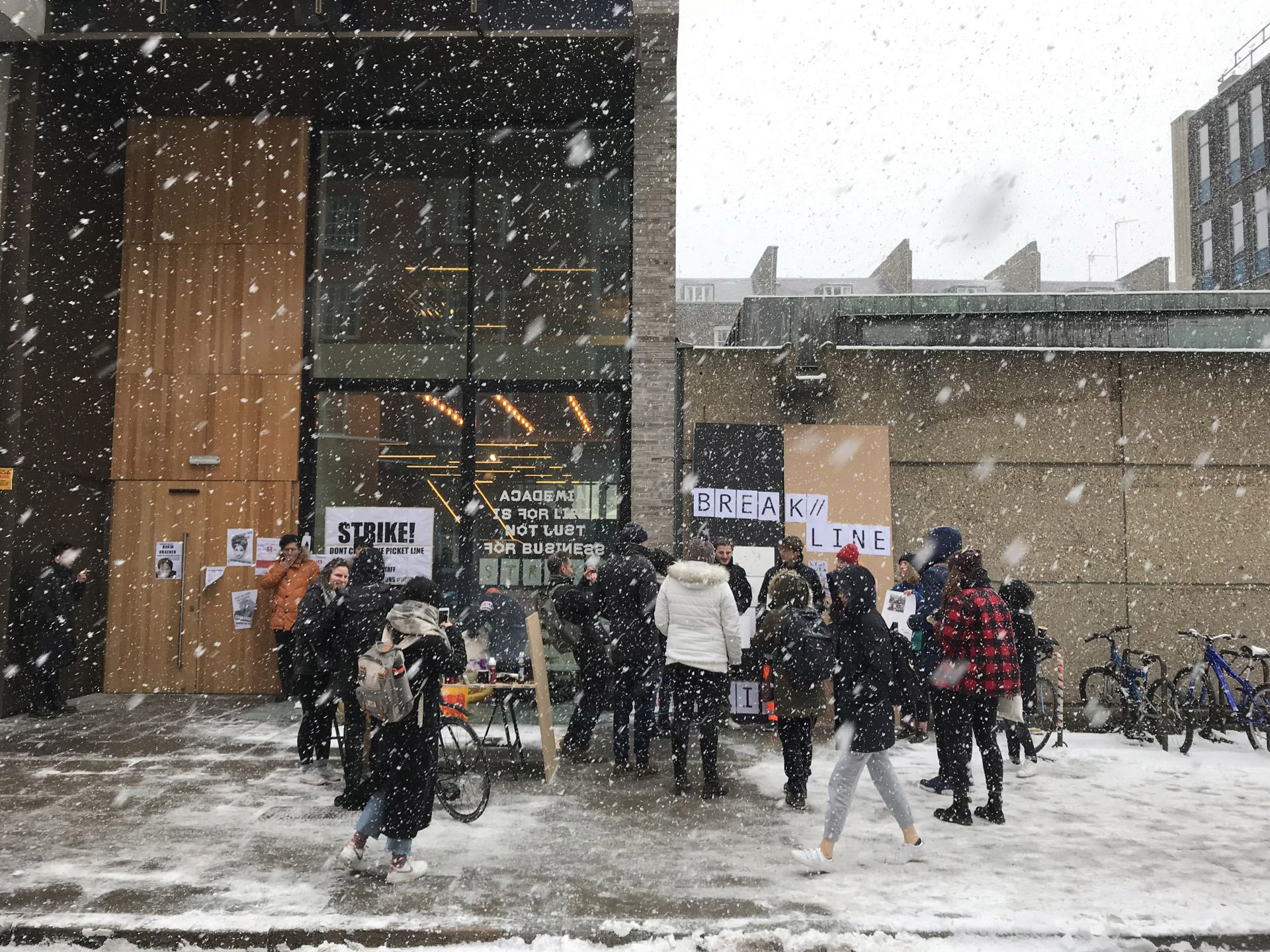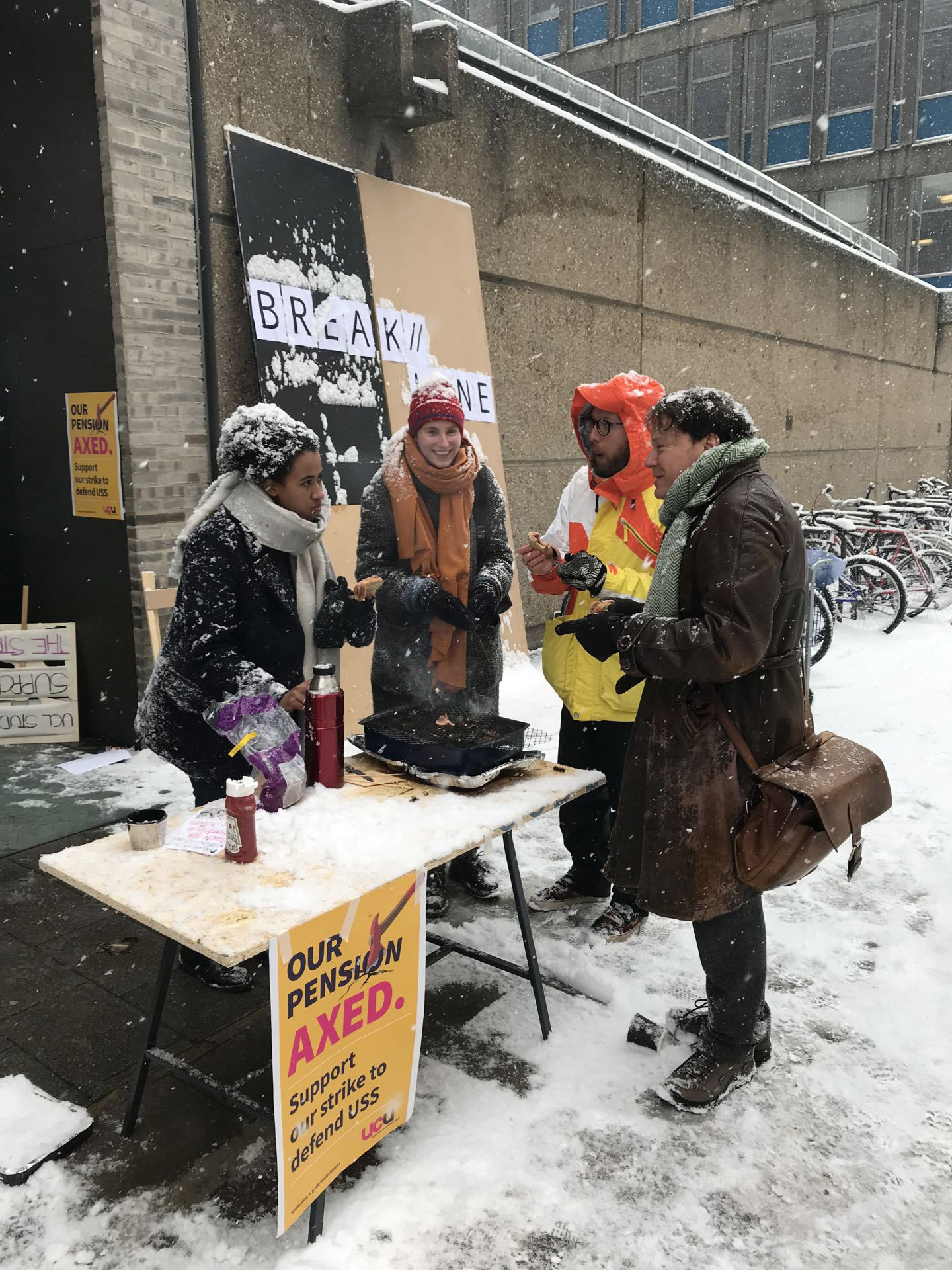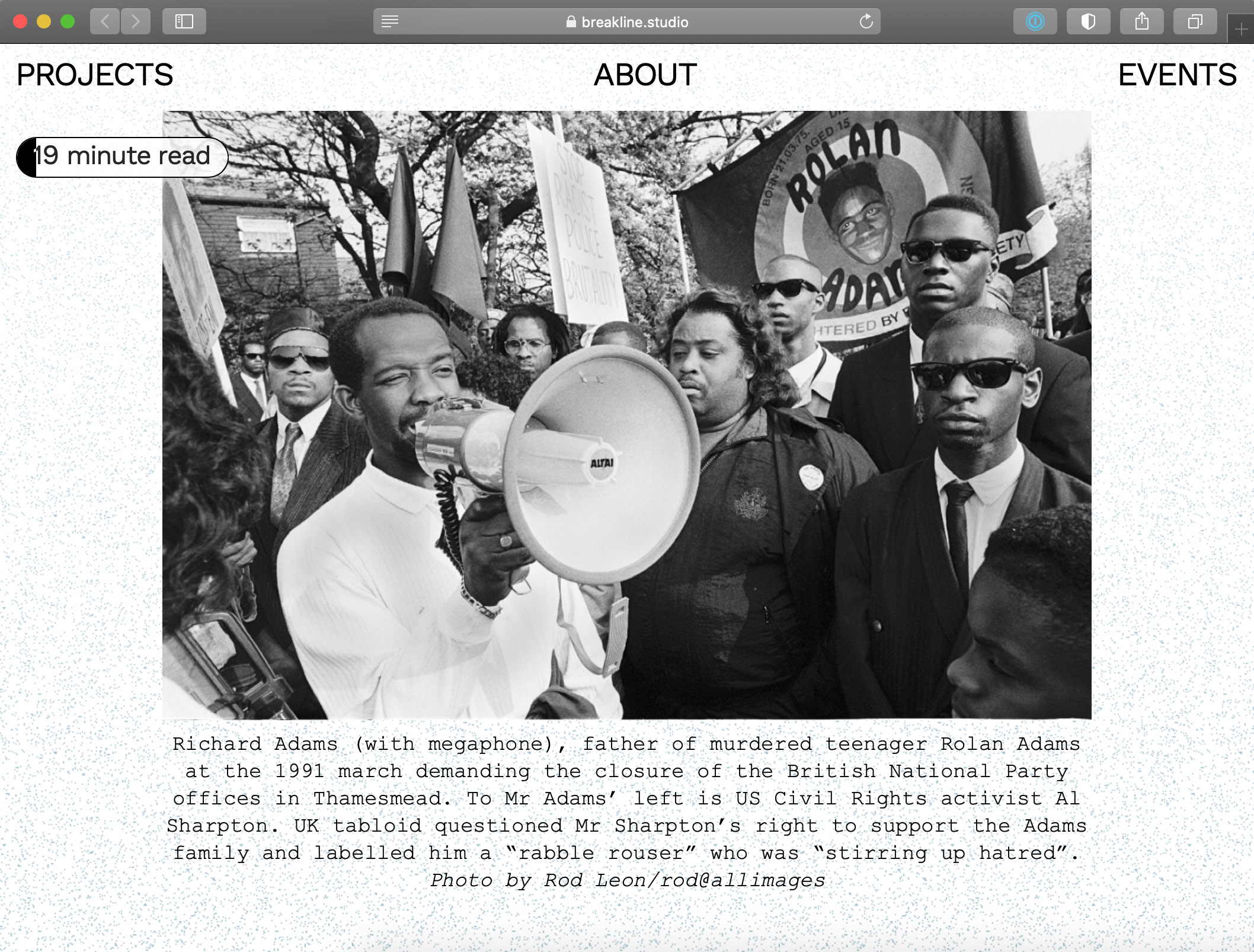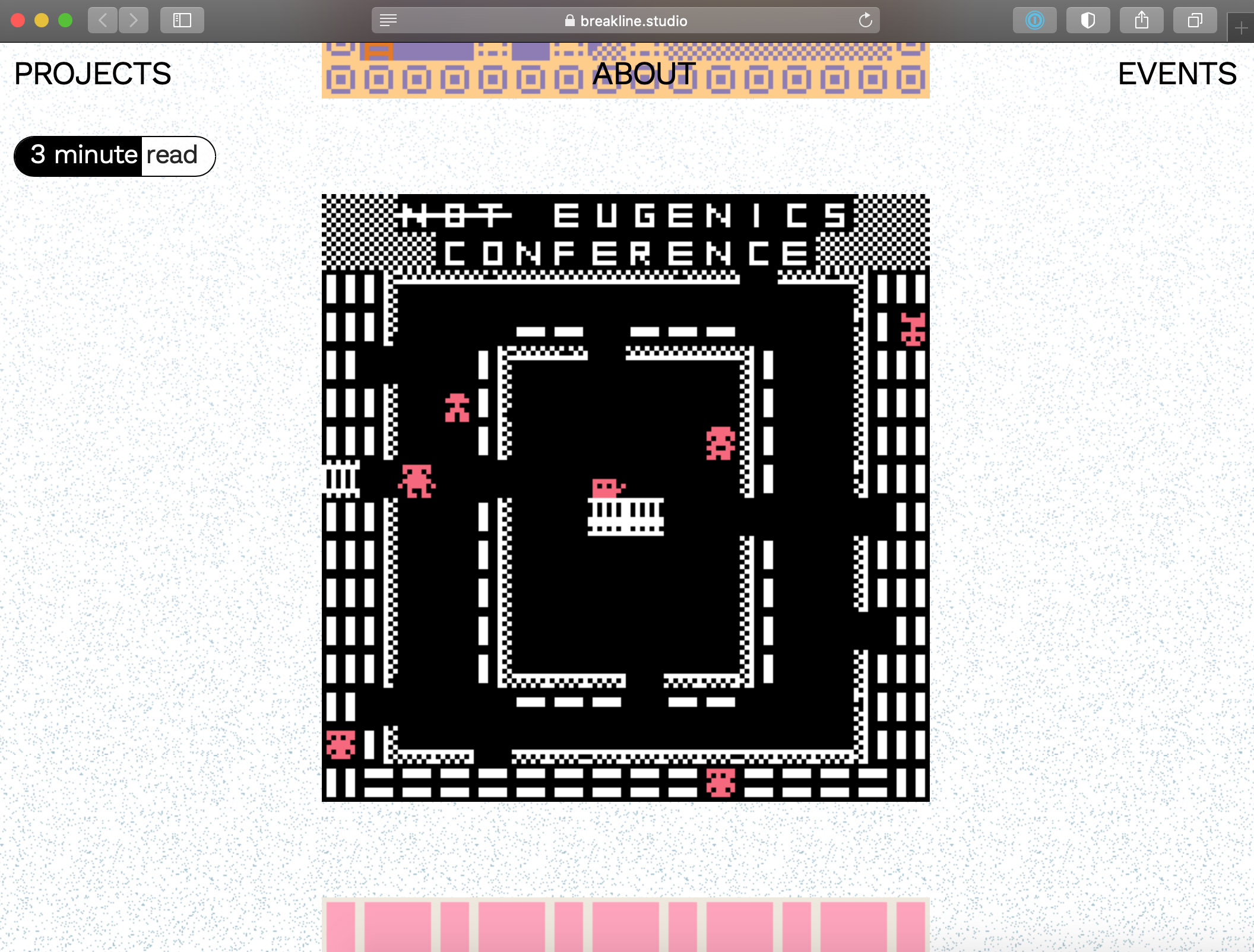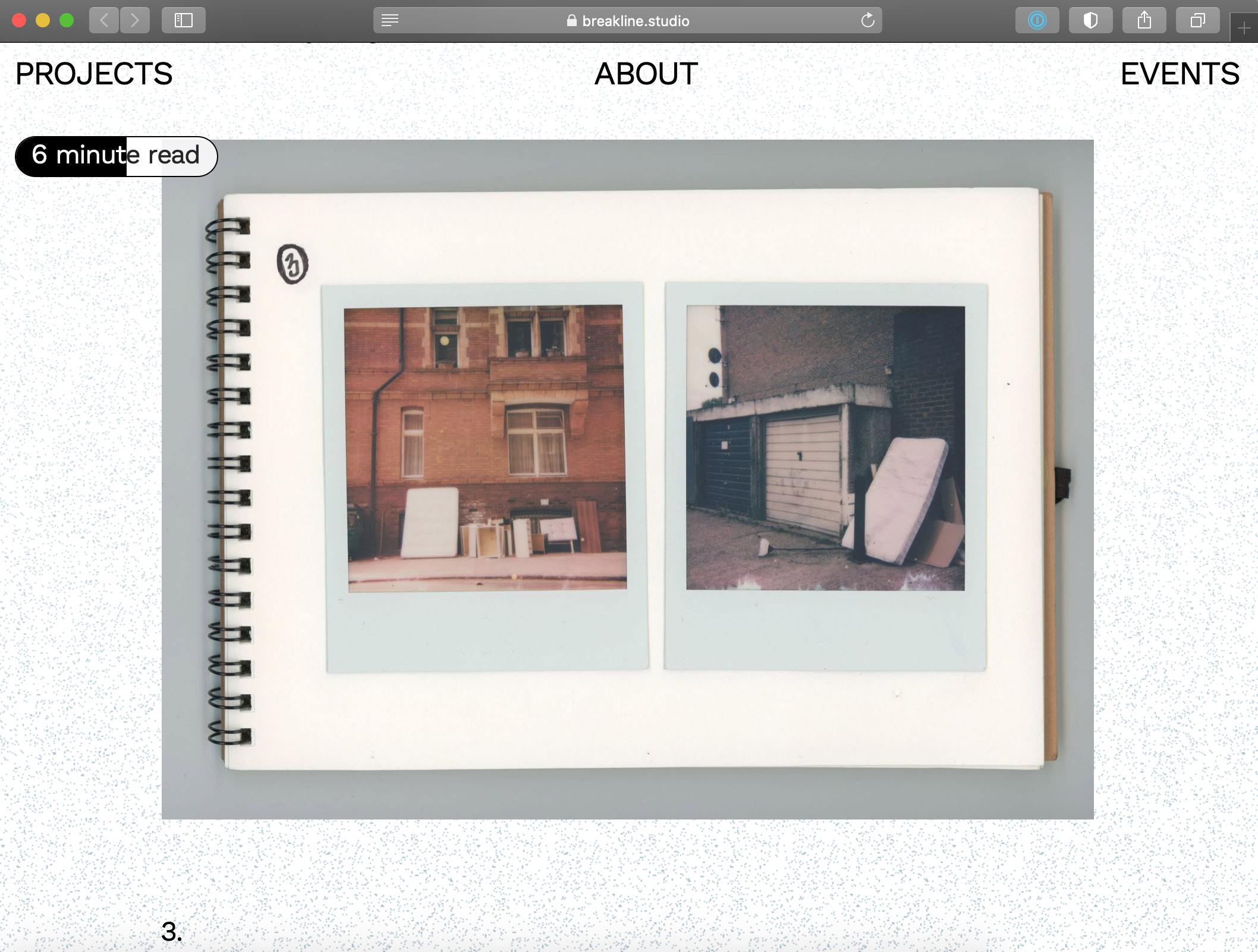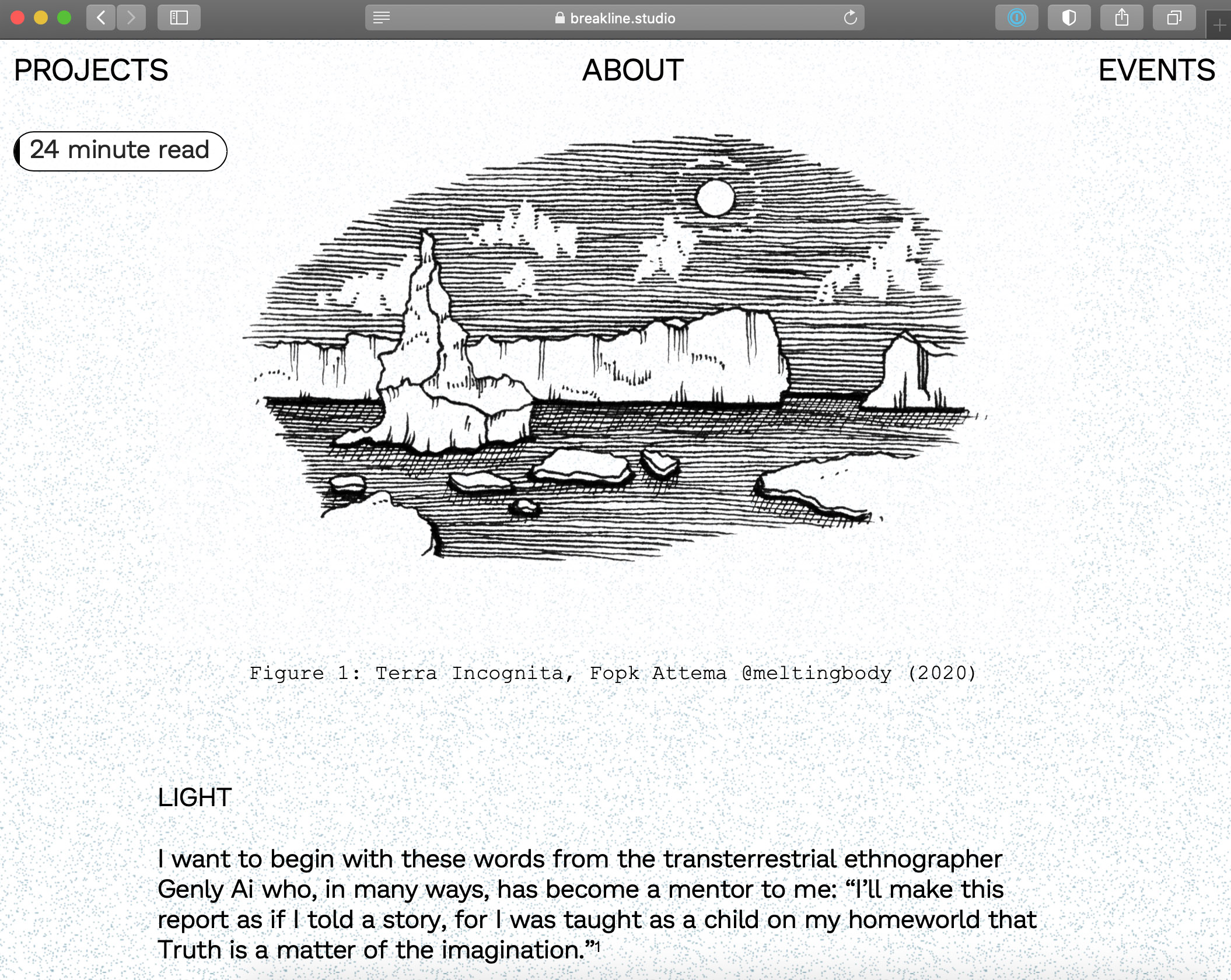UNBUILDING
BREAK / / LINE is a project by and for those who oppose the trespass of capital, the indifference towards inequality and the myriad frontiers of oppression present in architectural education and practice today. In 2018, the Bartlett Faculty of the Built Environment advertised a new position of Vice Dean Equality, Diversity & Inclusion (EDI), the first such senior appointment at a UCL faculty. At this time, the Bartlett staff and student members of BREAK / / LINE were on the picket line outside striking against precarious employment practices, unsafe workloads, falling pay, the gender and race pay gap, pension cuts, and for education as a public good, accessible and affordable for all. We have been on strike every year since.
On the picket then, thick with swirling snow, BREAK / / LINE cooked up a BBQ breakfast for strikers and cooked up plans to intervene in this new position by instigating a network of student-staff ‘active intermediaries’ — a concept adopted from Beth Perry’s work which critiques the capacity of organisations to absorb and embed critical feedback in real time as initiatives are put in place. The network, as we saw it, would bring together existing student- and staff-led groups and projects across the Faculty; firstly, by establishing non-hierarchical, collaborative, open fora for critical appraisal of the themes of equality, diversity and inclusion (operating independently from the existing EDI group, with its dedicated focus on Athena SWAN); secondly, by conceiving of new cross-faculty initiatives; and thirdly, by maintaining regular communication with the Vice Dean.
In the following academic year, we formalised this pitch into a proposal setting out a year-long programme of creative activities to critically examine issues of EDI in higher education.
– A workshop with Unis Resist Borders to explore how hostile environment policies are enacted through academic institutions, and how students and staff can respond through creative resistance and building networks of knowledge and support. We aimed to explore how the university creates barriers, but also has potential to recognise and build on existing supportive practices to create welcoming environments for students and staff.
– A public hearing of experiences of people deported from the United Kingdom through recordings taken by the researcher Luke De Noronha, proposed for the first floor of the Bartlett. This was intentional, situated near the administrative offices, and those of the Dean and Director, and responding to a memo that had been sent to staff notifying them of their personal liability for monitoring foreign students’ attendance as an extension of the Home Office hostile environment policy. This public hearing aimed to create an aural environment – in sound and feeling – of the experience of the spatial disruption of deportation.
– A further workshop with the Precarious Workers Brigade, which aimed to explore how policies of casualisation and marketisation operate in higher education and offer tactics and tools for engaging with work and the economy; including examples of alternative educational and organising and enabling and engaging practices.
– A meal and public survey which sought to look at the exclusionary costs of studying, teaching and practising architecture, to be co-hosted with STORE - a London-based association of artists, architects and designers, composed of three core elements: an educational programme of art and architecture courses aimed at increasing the inclusivity of arts education, wide-ranging public events and exhibitions, and a socially engaged design practice.
– A beyond-the-crit through which students, staff and spatial practitioners would be invited to critique and propose alternative practices within built environment education, asking: what are the ways in which hostilities manifest in teaching and studying? How can we do things differently? What do we do really well?
– A series of temporary installations to be built and installed throughout the Bartlett which will assess and augment issues of accessibility in the building on the basis of intersecting reflections on disability, gender, sexuality, race and class. Together with invited artists, architects and practitioners from the schools of the Bartlett, we sought to ask: what are the ways in which the spaces of the building facilitate greater engagement, or act as barriers to inclusion?
The full realisation of these plans was curtailed and reconfigured under COVID. The workshop with Unis Resist Borders was held, as was the Public Hearing, and a workshop to devise the series of temporary installations. Dispersed in our homes across London and in the bewilderment of the pandemic, we met on zoom and socially distanced in parks to understand what could be salvaged of our plans. This scheming led to the curation of an online publication and symposium which brought together seven key thinkers (staff, students, security guards and alumni of the Bartlett) to analyse the varying manifestations of hostile environments in higher education. Titled ‘UNBUILDING’, the work resulted in the curation of seven original commissioned pieces of scholarship, each tackling a different form of hostility including trans and binary gender discriminations, racism, structurally embedded institutional barriers, and oppressive legislation.
UNBUILDING
Through this project we aim to investigate the spatial representations, practices and experiences of hostile environments in higher education, including but also going beyond the widely discredited but prevailing government policy of hostility towards people deemed to be undesirable immigrants to the UK.
Our previous events and actions within the Bartlett questioned isolationist, individualising working and teaching practices, have sought to understand the university’s complicity as an arm of the state’s violent, racist bordering practices, and enacted and celebrated alternatives, always and already present. When we first planned the project, we wanted to create collective ‘readings’ of experiences of hostility in institutional cultures and practices, and we wanted the collective nature of these ‘readings’ to also form an act of ‘public hearing’ - bringing these hostilities to the fore, enacting a different politics in the process, and providing space for an imaginary of how things may be constructed otherwise. When COVID hit, our plans changed. Instead of hosting events and interventions at institutions, we are publishing these ‘readings’ on the BREAK//LINE website.
We hope that this collection will allow for the expression of experiences and a collective form of listening. We hope to build an analysis of the current state of affairs; of the failings of institutions; of sites and practices which must be dismantled; and of existing, nascent and yet-to-be-realised modes which should be celebrated, supported, and imagined. Following K Punk and Ursula K Le Guin, we believe architectural education must be as much about unbuilding as building.
This project seeks to attend to the wealth of knowledge held in the moment when eyes catch, in lived, bodily experience, in intakes of breath and in ambitions for alternative presents. UNBUILDING is active and activated. It will not disappear into an end-of-year-report. Following Rosalba Icaza and Rolando Vásquez’s work at the University of Amsterdam, we seek to attend not only to who is at the university but also the what and how of university practices, ‘governance structures, emotions and life experiences, and ways of teaching and learning’.
This project is further informed by Sara Ahmed’s research into diversity practitioners and on complaint; Lola Olufemi, Odelia Younge, Waithera Sebatindira, Suhaiymah Manzoor-Khan’s A FLY Girl’s Guide To University; Ahmet Ögüt’s Silent University; Precarious Workers Brigade’s Training for Exploitation handbook; and Michael Kennedy’s Affordability Study at Central St Martins. It draws inspiration from the Graduate School of Architecture’s ‘Transformative Pedagogies’ teaching and research program; Jacob V Joyce’s participatory public-facing workshops ‘Decolonising Drawing’; the ‘Queer Anarchy Summer School’ and STORE’s program of educational courses as socially engaged design practice.
